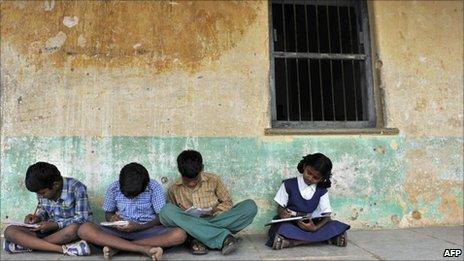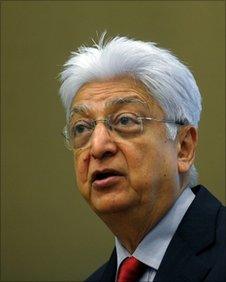India schools get gift from billionaire Azim Premji
- Published

Government schools in India are criticised for poor standards of learning
Hidden behind the tall glittering facade of multinational software firm Wipro's headquarters in the southern Indian city of Bangalore is a two-storey brick and glass building - the office of the Azim Premji Foundation.
If the plans being worked here come to pass, they have the power to transform the face of Indian education.
In December, Wipro chairman, software tycoon Azim Premji, created a $2bn (£1.24bn) fund to improve education in rural and small-town India.
The fund dwarfs any charity by the wealthy in India so far and many are describing him as India's Bill Gates or Warren Buffett. It is hoped that more wealthy Indians might follow his example.
Rather than build more schools, the Premji Foundation plans to set up a university in Bangalore which will churn out thousands of "education experts" to help raise standards across the country.
"These are not teachers. These are people who design curriculum and examinations, who decide how teachers should be trained," explains Anurag Behar, one of the foundation's two CEOs.
"The biggest problem ailing Indian education is the lack of quality people."
India currently produces 50 to 60 education specialists a year - and that is far too few, he says.
'Islands of excellence'
India's school system is huge: there are 1.4 million schools and seven million people working in the education system.
But its report card can at best be described as mixed. Under the Sarva Shiksha Abhiyan (Education for All scheme), the government is committed to establishing schools near every habitation.
And campaigners say the government has done a good job for the most part - 98% of habitations have a school within walking distance.
The government also seems to have done well on enrolment. According to statistics, total sign-up from grades one to eight is 94.9%, and 77% from grades one to 12.
But that's where the positives end: a quarter of students drop out by grade five and almost half (46%) leave by grade eight.
Campaigners say poor quality education and untrained, unqualified teachers are a major factor in the drop-out rate. Those pupils who do remain learn little, in time joining the vast army of unemployed.
"The quality of learning is pathetic in government schools - 35% of children in class five cannot read or write," Mr Behar says.
This is the issue the Premji University will try to address.
Contrary to popular perception, the foundation will not be setting up any schools.

Azim Premji says better education will lead to a fairer Indian society
"We didn't want to go into establishing islands of excellence," Mr Behar says. "We could have said, let's establish 100 great schools where we would take underprivileged children.
"But 100 great schools would be just that - 100 great schools. Now 100, 200 or 2,000 is a meaningless number when you talk of 1.4 million schools."
'Media-shy billionaire'
The Premji Foundation says it will work in close partnership with the government.
Its new university aims to produce 2,000 graduates a year and will offer programmes only in teaching and education.
Admissions will start in March and the first batch of 200 students is expected to begin classes in July. In five years, it plans to have 4,000 students.
Classes will be held in a temporary building for now while the university campus is built on a 100-acre plot of land not far from the Wipro campus.
Mr Premji talked of good education underpinning a "just, equitable, humane and sustainable society" when he announced the setting up of the fund in December.
He is the third richest Indian and the 28th richest person in the world, with an estimated net worth of more than $17bn (£11bn).
Despite his riches, he is known for an austere lifestyle and has said in the past that he plans to give away most of his money to charity.
India's government, naturally enough, has welcomed the education fund.
"It's a very good decision. I congratulate Premji," Finance Minister Pranab Mukherjee said soon after it was set up.
It is too early to say whether Mr Premji's plans for revolution in India's schools will work, or how soon improvements might begin to filter through.
What's not in doubt is the media-shy billionaire's commitment to the cause of education.
'Silent emergency'
His foundation has worked in the education sector since 2001, supporting 20,000 schools in nine states.

India's annual government spend on education is meagre compared with other countries
In Karnataka, the focus has been on reforming the way students are tested, to ensure they are assessed on competency rather than on rote learning.
Rajasthan has been given help to develop workbooks for schools. In Uttarakhand, the foundation is supporting teacher training in 1,600 schools.
Results have been promising and encouraged the foundation to start thinking two years ago of setting up the university.
India - with its 1.2 billion people - spends a meagre $9.1bn (£5.9bn) a year on education. That's about 1.5% of the annual budget - a fraction of what is spent in Western countries.
Bidisha Fouzdar, who works with the education campaign group Child Rights and You, says the lack of quality school education "is like a silent emergency".
She has been demanding that government spending on education be raised to 15%.
"If Azim Premji is trying to improve the quality of education, then that's a very good plan," she says.
- Published2 December 2010